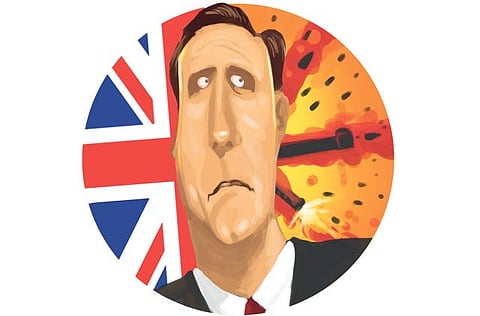Lesson in foreign policy for Cameron
Andrew Rawnsley writes: Arab uprisings ought to teach British prime minister that there is more to his job than being a travelling salesman

The British Foreign Office has always regarded itself as a cut above the rest. So probably would you if you were one of the inhabitants of King Charles Street.
The walls are hung with oils of great figures from Britain's imperial past. There is so much gold leaf, glass and marble that even a Russian oligarch might think it a bit too blingy for his bathroom.
Foreign Secretary William Hague's suite is much more spacious and splendid than the humdrum digs occupied by the mere prime minister across the road. Suave, urbane officials smooth along the gilded corridors.
The diplomatic corps think of themselves as a superior breed to the more plebeian civil servants at health, transport and the other domestics of Whitehall.
What a grand department this is and what a mess it has made of evacuating Britons stranded in Libya. We can all agree that it is not a simple task to extract endangered citizens from a country in revolt against an unhinged tyrant.
The situation is highly chaotic and extremely violent. Reliable information is scarce. Logistics are a nightmare. But even taking all that into consideration, the performance of Her Majesty's Foreign Office has looked pathetic.
The French, the Germans, the Americans, the Turks, the Austrians, as well as much less well-resourced countries than Britain, were far quicker off the mark. It is a first-class fiasco when the prime minister has to say he is "incredibly sorry" for the performance of one of the great offices of state.
Now, Number 10's spokespeople are assuring us that Prime Minister David Cameron has taken a personal grip on the crisis. That may even be true. But the bloody convulsions in Libya also pose some big questions about Cameron, none larger than this: does he have a foreign policy?
It is not fair to say that he came to office without one, but it is reasonable to suggest that his foreign policy could be summarised on the back of an envelope. 1) Concentrate on domestic affairs. 2) Get out of Afghanistan as soon as we decently can and avoid any further foreign entanglements. 3) Hope Europe does not throw up anything which provokes my backwoodsmen. 4) Demonstrate the compassionate side of my Conservatism by maintaining the aid budget. 5) Sell more stuff abroad. 6) Concentrate on domestic affairs.
It was a list of bullet points rather than a fully developed strategic approach. In the early period of his premiership, he gave the impression misleading perhaps, but definitely felt that he thought foreign policy began and ended with trade.
It was in a mercantilist spirit that last month's prime ministerial tour of the Gulf States was originally conceived. Cameron's aeroplane was loaded with business chiefs, among them eight representatives of arms and aerospace firms.
The stopover in Cairo was a last-minute addition, which allowed Number 10 to boast that he was the first foreign leader to visit Egypt since the fall of Hosni Mubarak. A better face was also put on the tour by his pro-democracy speech to the parliament in Kuwait. Cameron is a reactive politician, but quite often his reaction can be a good one.
His comments on the Arab uprisings during the tour are a huge improvement on the mealy-mouthed hesitations which characterised his government's initial response to the unrest.
But it leaves unaddressed and unresolved the contradiction of calling yourself a friend of freedom while simultaneously leading a caravan of weapons salesmen to autocratic regimes. Number 10 has squirmed trying to explain that one.
The second part of the education of Cameron has been about Britain's role in the world. He has seemed to believe that Britain should concentrate on bilateral relationships. The value of international organisations ought now to be clearer to him.
Confronted with a psychotic tyrant who is murdering his own people and may take its citizens hostage, Britain cannot do much on its own. Meaningful pressure on Muammar Gaddafi is only likely to be achieved by concerted international action agreed at the UN and coordinated with the European Union and the US.
This crisis does seem to have increased Cameron's appreciation that he needs a good foreign policy. Perhaps the Foreign Office can help out. The smoothies of King Charles Street are supposed to excel at that, at least.
Well, here's hoping.


